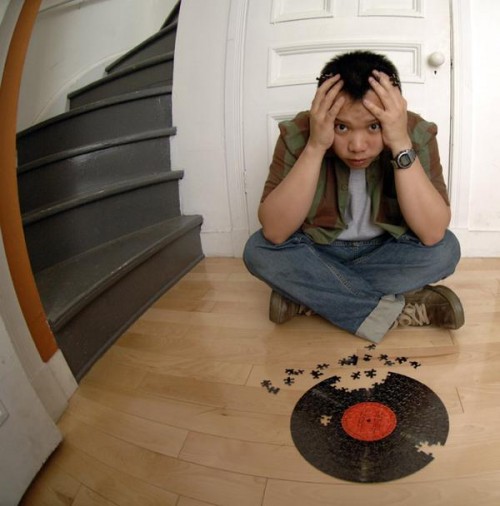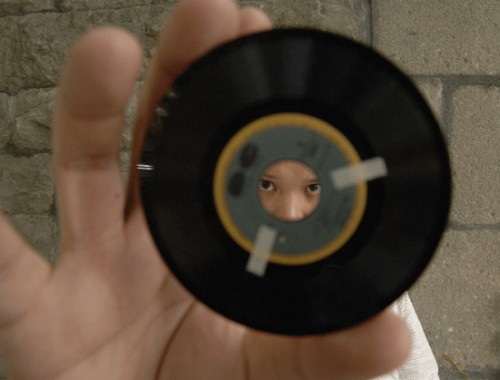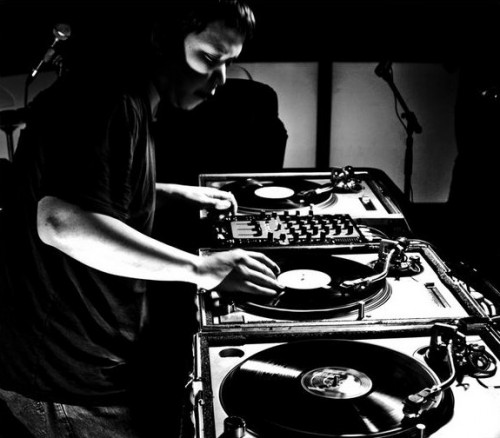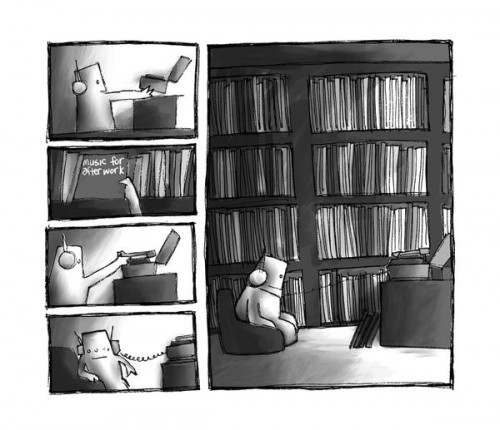Kid Koala

Hip-Hop Core: So, to begin, can you introduce yourself?
Kid Koala: Hello, they call me Kid Koala. I come from Montreal, Canada.
HHC: Ok, so when did you start deejaying, how and why?
KK: I started in 1988, I was twelve years old and it was just… That thing, you know, when you're that age you're always looking for something to express yourself through. So for some people it's with skateboards, some people it's a spray can, some people it's sports, but for me it was scratching.
HHC: And how did you meet this form of expression?
KK: Just hearing it on records really was the first time I remember, I was in Vancouver so I was in the woods kind of, I didn't know any older DJ's, I wasn't old enough to go to clubs or see any of the shows, so everything I learned I just learned from listening to records and trying to figure out how the mechanics were behind those sounds; so it was just a lot of trial and error and studying. That's pretty much it. But before that, musically, I started with the piano when I was four years old, so I had a bit of a classical music background. But what I liked about turntables was that it was much more expressive I found, than my classical music training was very strict and very focused on playing a certain way, the way it's been played for hundreds of years, very restrictive, and everything was always for preparing for a piano competition or an exam, or… It basically took the love out of the music for me. Scratching on the other hand, there was no future in it really, it was just, you did it because you were into it, everyone who was doing it, it was just a craft, and they fell in love with the craft, and so that's what really drew me to the whole scene. It seemed to be a philosophy, a youthful expression, and the main theme behind it was always "do something fresh, no matter what you heard before, earlier in the night or whatever, when it's time for you to get on the turntables you have to fit your own personality into it". So it felt very expressive.
HHC: So what are your first memories linked to hip hop music and did you have a DJ that really influenced you back in the day?
KK: Back then… We're looking at the late eighties which was my point of entry, so Public Enemy, obviously there's the Bomb Squad production, there was Daddy Rich, Jazzy Jeff, Mr Mix from 2 Live Crew. But that was that first season when I was introduced to it, and then once I fell in love with the craft I just followed it, backwards and forwards, so from there I learned about Flash and all the early days and studied that and just really got into it. You just become a student of the craft. So for me my early influences was that year, 1988. Because before that, I didn't have money to buy music, and it wasn't like now where you can just hear it if you click on a button, I had to deliver newspapers and save my money and buy one twelve-inch a week. I remember, I'd always go into the record store every Tuesday and go "Oh, there's a Public Enemy record!" and this was before they even let you listen to it, it was sealed and I was like "alright, I'm going to try it", but luckily for me, there were a lot of records that really inspired me back then. Prince Paul's work, and Stetsasonic, De La Soul, just completely modern.
HHC: When you came into hip hop, it was a very experimental time. You were talking about Prince Paul, the way he was using samples can sound sometimes like what some turntablists do today like Cut Chemist or you, or some other people.
KK: For sure, I think Paul is a huge inspiration for a lot of us because he kind of opened up the crates, the source material, he said "it's all fair game, whatever you can find, as long as when you put it together it works, then do it". I learned a lot from that. That's sort of part of the range of instruments is that, you can take every piece of recorded vinyl - which is infinite already basically - and then multiply that by all the techniques and all the ways you can bend new melodies and make new rhythms. So it's an expansive instrument and I like that about it and I try to keep that mind frame when I'm digging for stuff or putting a set together.

HHC: Use it to the maximum?
KK: Well I actually feel that if you can connect the dots, all music is… If it's from the heart, I don't really care. I don't care if it's some guy playing wine glasses, or someone just singing blues over a guitar, or a funk band, or a jazz crew or gospel… Irish jig music, an accordion player, as long as it's coming from the person, I enjoy it. That's what I like about scratch, I feel it's a very tactile instrument, when you can feel that human side of it, that's what makes it interesting to me. I remember the first time I heard scratching, it was like… I don't know how it was being done but I could tell from the feel that there was somebody who learned how to take a sentence and stutter all the words into a new rhythm and just flow with it, and it required a certain mastery of that instrument and it was intriguing to me.
HHC: So when exactly and how did your passion for deejaying become more serious? When did you realise you were going to do it for a living and that it was going to become all of your life? And how did it affect your life?
KK: I think that moment where I knew it would affect my life was the first time I tried it. It was just one of those… It represented possibilities for me. I tried it and I was like "wooah!". This is a sound even backwards unheard of, now it's possible, you learn how to do a bunch of things, there's just more and more possibilities. As far as the profession is concerned, I'm still surprised when people show up to come see me play because when I was starting in the eighties there weren't DJs out on tour, flying around, putting albums out on their own…
HHC: ...and working with a band.
KK: Yeah, so the fact that I had that opportunity, I feel very grateful for that. I'd say when it got official for me was probably when Ninja Tune signed me in 1996, because before then I was making tapes and playing in a band, I was scratching in a live instrument band and we had gigs and I was learning how to perform, how to recover from skipping, learning how to do all kinds of new things on the turntables but it was still very much a hobby and a passion. But I think after Ninja Tune signed me it became sort of a full time affair so they put me on the road, I started travelling around and meeting other musicians and learning about the studio and learning how all the rest of that music industry worked.
HHC: Did it influence you in your music, the fact that you travelled a lot?
KK: Oh yeah, you can't travel and not be inspired, because there's so many different places to see that can enrich your sound and your ear, but at the same time, everywhere you go, it's almost kind of the same too in that people go witness music or people who are interested in music, it's because they want to feel a connection through art. The people on stage are still trying to communicate something. Those lines, those connections I think is at the crux of what deejaying is, it's like you take two sounds that don't know about each other but you put them together and they actually have a new relationship and actually… It's kind of like having a weird dating service (laughs), you try and put things together and sometimes they work and sometimes they don't but often, when they do work, it's like wow, the combinations.

HHC: You told us that in your environment scratch music was not taken seriously and that before that you were doing music because you were forced to and there was no pleasure in it. How do your family and friends perceive it? How do they see your work?
KK: Well, more recently my parents have been coming to the shows and my family's been very supportive of it. I started when I was a teenager when everyone's being very rebellious, you lock yourself into your room, you're anti-social, you're spending all your time practising; they thought it was a problem, a phase. But really you're just trying to find a way to express yourself, and I think when my parents realised that, when they come to the shows and they see, "he's not hurting anybody, he's just out there trying to facilitate a good time or trying to inspire something or trying to perform, share music with people", they realised that it's a good thing. Even though my parents are very traditional, my father is a doctor, well a scientist, and my mother's an accountant, so the music industry is something very hard for them to understand, but when they do come to the shows they really have a great time and then they see that at the end of it… You have to understand, my parents don't go out, so they're like "oh you stay out late, you go to clubs", "oh we heard about some club that caught on fire and some people got trapped and they died" and my mum calls me and she's like "make sure you know where the fire exit is" and I'm like "mum it's not like that all the time, you should come to some of these shows" and then she'd realise, it's about sharing music, it's about the communal experience, bringing people together and just jumping on one vibe. So she gets it now I think.
HHC: You worked on a hip hop classic with Dan The Automator. Can you talk about it?
KK: Dan I met also in 1996 in New York and we hit it off. I think we had this same sensibility about music.
HHC: There is something very atmospheric, very produced but sweet.
KK: We speak the same musical language. So when he's asking me for certain parts, he'll say "something has to happen here" and I'll be like "oh I have an idea" and sometimes he'll have more direction, "I actually feel it should lift here but turn into a melancholy break" and I'll be like "Oh I have the perfect record" and I'll cut it in and we'll just try stuff, it's just a great working relationship. Those projects are for the love of the craft too, the music.
The first thing we did was Handsome Boy Modelling School One, I just scratched on a couple of things, then I did Deltron 3030 with them and I did all the turntables for that and then I did Lovage with Mike Patton and him and Jennifer Charles and I did all the turntables on that. And so we did a few tours together and it's been, you know, a really great experience, and now we're doing part two of a lot of those and then we did Gorillaz and all that stuff.
HHC: What is your role in the Gorillaz music?
KK: I'm just brought in as the turntable layer so I don't write the songs, I just come in and I try to sweeten it, I try to lace it with something. But I find my role in Gorillaz is a lot less significant than in Deltron or Lovage. Those records started with me and Dan passing stuff back and forth, I'd throw on some cuts and he'd try to add some parts and throws it back, and then we'd give it to Del or we'd give it to Mike and so right now, I've actually finished the turntables on the new Deltron, and all the beats are finished too, and Del's… Last I heard Del's on track seven.

HHC: Yeah because he has a new album out so I guess he's also working on it to do promotional tours…
KK: Yeah. But the thing with Del is that when he's in the zone, he just writes. When he's focused he can just do it.
HHC: He seems to be a strange character, a strange person.
KK: He's a very creative mind, you know what I mean? For sure. With the Deltron, the stuff that I've heard already is amazing, I actually think the new Deltron record is way better than the last one. And there's also a new Lovage album, I've done one pass at tables on it already but we're going to wait for Mike and Jennifer to do some lyrics and then I'm going to play off their lyrics as well, add some layers and mix it and go.
HHC: What are you listening to these days? Is there some new stuff that you're listening to, or are you listening to some old stuff?
KK: Everything, one record that's really blown me away in terms of the arrangements and the performance is Billie Holiday, Lady in Satin, one of her late records, right before she stopped recording. A lot of people don't like that record because they feel that her voice is too broken. But I actually feel it's just more potent, ‘cause she almost has to try… She has a beautiful voice regardless, but after all the years of what she'd gone through, a lot of people don't consider that Billie Holiday music, but I actually felt her performances on that are just amazing. And then I liked the new In Rainbows, obviously, Radiohead, it's a brilliant, brilliant record. On the rap scene, Eyedea & Abilities, those dudes, the drums that Abilities hooks up I actually think are amazing. I think he's from Minneapolis. I get sent some of these records in and I'm like "woah, who is that?" and they're like "DJ Abilities"…
HHC: So what are your next projects?
KK: The next project for me is this graphic novel and it's a story about a mosquito that plays jazz clarinet in the big city, and so it's like a 300-page story all done in photos of like maquettes, little models and characters. We're shooting the book right now but I'm also recording the soundtrack to it and so that's the next big thing. And then there's a rock project that's kind of like a turntable Black Sabbath thing. A lot of what I was playing tonight was tests from that new record, called The Slew, and it's me and a gentleman by the name of Dylan Frombach in Seattle, and we've been working on this record for a couple of years now but we're going to mix it in April with Mario Caldato, Mario C from Beastie Boys, 'cause we want that big sound for the final mix, and I think he understands the rock but then he also understands the hip hop as well and how stuff just has to bang. So I'm very excited about that. That should be out on Ninja Tune, maybe next year. So there's that, The Slew, Deltron, the new Lovage, this book, and when the mosquito book is finished I'm going to do a special tour with no dance floors, it's just going to be in jazz clubs and cabarets, and it's going to have its quartet, double bass, piano, four turntables, and it's just going to be like a book launch show that introduces the story, the characters, the music from the soundtrack… I just want to try something else.
Interview by Fred & Hugues
March 2009
Note: Interview originally recorded in April 2008. Since the interview has been made, the mosquito's book hasn't been released but you can go check the website www.nufonia.com.
Photos 1 & 2 by SekondHandProjects
Photo 3 by flowculturephotography.com